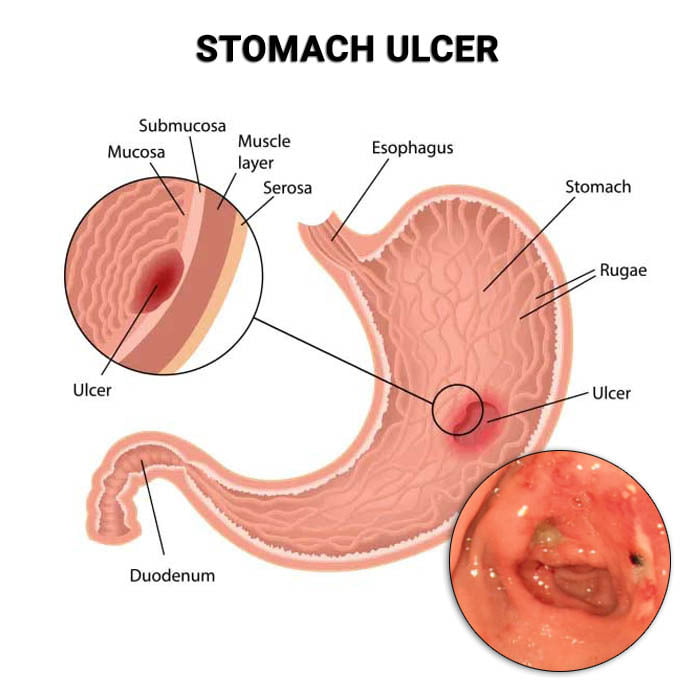Peptic Ulcers: Causes, Symptoms, and Treatment Options

Although peptic ulcers were once believed to be caused mainly by stress or spicy foods, most cases are linked to infection with Helicobacter pylori (H. pylori) or long-term use of certain medications such as non-steroidal anti-inflammatory drugs (NSAIDs).
Symptoms can range from mild discomfort to serious, life-threatening complications, including bleeding or perforation. Treatment focuses on relieving pain, promoting healing, and preventing recurrence.
Common Symptoms of a Peptic Ulcer
Peptic ulcer symptoms vary from person to person and may include:
-
Burning or gnawing stomach pain
-
Pain that worsens on an empty stomach
-
Bloating or indigestion
-
Nausea or vomiting
-
Loss of appetite
⚠️ Seek medical attention immediately if symptoms include black stools, vomiting blood, sudden severe abdominal pain, or dizziness—these may indicate bleeding or perforation.
Common Remedies and Treatments for Peptic Ulcers
Treatment depends on the cause, severity, and presence of complications.
Medications That Coat and Protect the Stomach
For mild or intermittent symptoms, medications that protect the stomach lining may provide relief:
-
Bismuth subsalicylate (over-the-counter) coats the ulcer and shields it from stomach acid
-
Sucralfate (prescription) binds to stomach acid and forms a protective paste-like barrier over the ulcer
These medications do not cure the ulcer but help reduce irritation while healing occurs.
Antacids
Antacids work by neutralizing stomach acid, making it less irritating to the ulcer.
Common antacids include:
-
Sodium bicarbonate
-
Magnesium hydroxide
-
Magnesium oxide
-
Aluminum carbonate
-
Aluminum hydroxide
Antacids may relieve symptoms but do not treat the underlying cause of peptic ulcers.
Acid-Reducing Medications
These medications reduce acid production and allow ulcers to heal more effectively.
Proton Pump Inhibitors (PPIs)
-
Block acid production by shutting down proton pumps in the stomach
-
Commonly used for both gastric and duodenal ulcers
Histamine-2 (H2) Blockers
-
Prevent histamine from stimulating acid-producing cells
-
Reduce overall stomach acid levels
Antibiotics for H. pylori
Because H. pylori infection is the most common cause of peptic ulcers, antibiotics are essential when the bacteria is present.
Common antibiotics include:
-
Metronidazole
-
Tetracycline
Completing the full course is critical to prevent recurrence and complications.
Surgery (Rare Cases)
Due to the effectiveness of modern medications, surgery is rarely required. It may be necessary if complications occur, such as:
-
Bleeding that cannot be controlled
-
Intestinal obstruction
-
Perforation of the stomach or intestine
First Aid & Medical Disclaimer
This information is provided for educational and first aid awareness purposes only and does not replace medical diagnosis or treatment. Peptic ulcers can lead to serious complications if untreated and should always be evaluated by a healthcare professional.
Understanding digestive emergencies, internal bleeding signs, and when to seek urgent care is a key component of First Aid and CPR training in Canada.
